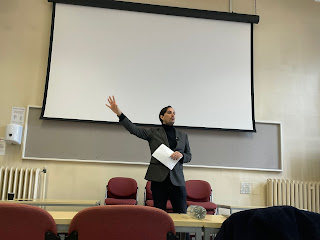This post is by Dan Degerman, Leverhulme Early Career Research Fellow at the University of Bristol. Dan is soon to join project EPIC.
 |
| Some members of team EPIC: Matthew Broome, Ian Kidd, Dan Degerman, Havi Carel, Kathleen Murphy-Hollies, and Fred Cooper. |
Silence is an important phenomenon in mental health. But while philosophers have had much to say about the social silencing of people with psychiatric diagnoses, other ways in which silence can feature in psychopathology have been underexplored. In a recent workshop at the University of Bristol, generously funded by the Leverhulme Trust, we sought to begin to address this neglect by exploring the different faces of silence in psychopathology.
Ian Kidd opened the workshop with a talk that explored painful silences common in bereavement grief. In particular, he focused on four silences, each characterised by a loss of communicative possibilities that follows the death of a loved one. This included, for example, silence as the loss of the distinctive communicative style of the deceased and silence as the permanent absence of narrative closure. For the person subject to these silences, they are painful for three reasons, Ian explained. Firstly, these silences cannot be filled. Secondly, they involve the awareness that the ways of being in the world the relationship with the deceased made possible are now impossible. Thirdly, they involve the awareness that one can no longer be the same person that one was with the deceased.
 |
| Ian Kidd |
The second speaker, Richard Stupart, drew on accounts of investigative journalists working in South Sudan to shed light on some of the mental dangers of being silent. He argued that journalists are at a heightened risk of moral injury, referring to the negative psychological impact a person experiences when they are unable to respond to a situation in what they consider a morally appropriate way. Journalists in conflict and crisis situations are particularly vulnerable to such injury because they often find themselves subject to structural pressures that may prevent them from communicating their knowledge about morally charged stories.
 |
| Richard Stupart |
Inner speech in mental disorders was the subject of the next talk by Sam Wilkinson. He defended what he called a strong dialogical account of inner speech, which entails that all inner speech is directed at a recipient, namely, ourselves. This account also suggests, among other things, that inner speech plays a central role in shaping our identity. Sam then outlined some ways this account can help clarify the implications of inner speech and its absence in different mental disorders. For example, the strong dialogical account indicates that negative inner speech in anxiety and depression is not just an epiphenomenon of pre-existing a person’s feelings but that it can create a downward spiral of those feelings.
 |
| Sam Wilkinson |
The fourth talk by Anna Bortolan examined experiences of silence in social anxiety. Drawing on some distinctions proposed in a recent paper on silence in mood disorders, Anna showed that these capture experiences described by people with social anxiety as well. She then went beyond that account to argue that a further two experiences of silence can be discerned in accounts of social anxiety. The first is characterised by a perceived inability to fill certain silences when one wants to do so, and the second is accompanied by a diminished sense of agency over how silences are filled.
 |
| Anna Bortolan |
Finally, in my talk, I argued for the importance of attending to first-person experiences of silence in psychopathology through a case study drawn from accounts of depression. Using a phenomenological framework inspired by the work of Merleau-Ponty, I described an experience common in first-person accounts of depression that I termed empty silence. This is an unpleasant experience that involves a solicitation to speak and a breakdown in a person’s habitual relationship with words, which confronts them with their own outward and inner silence. I proceeded to argue that if lived repeatedly, it may give rise to bodily doubt in one’s ability to speak.
The workshop was the capstone event for my Leverhulme Early Career Fellowship. However, it also served as an informal launch event for the EPIC project, with many of its team members in attendance, including Ian Kidd, Havi Carel, Matthew Broome, Fred Cooper, Kathleen Murphy-Hollies, and myself. The conversations and explorations that began during this workshop on silence and psychopathology will continue as part of the project, and if you are interested in contributing or participating in some way, please do get in touch.

No comments:
Post a Comment
All comments are moderated.